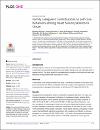Family caregivers' contributions to self-care behaviors among heart failure patients in Oman.
| المؤلف | Alharrasi, Maryam |
| المؤلف | Alnoumani, Huda |
| المؤلف | Al-Ghassani, Amal |
| المؤلف | Amirtharaj, Anandhi |
| المؤلف | Bin Ali, Wafaa |
| المؤلف | Al-Zakwani, Ibrahim |
| المؤلف | Aldaken, Laila |
| المؤلف | Al Hinai, Mahmood |
| المؤلف | Abu Raddaha, Ahmad H |
| تاريخ الإتاحة | 2025-03-27T06:19:03Z |
| تاريخ النشر | 2025 |
| اسم المنشور | PLOS ONE |
| المعرّف | http://dx.doi.org/10.1371/journal.pone.0319827 |
| الاقتباس | Alharrasi M, Alnoumani H, Al-Ghassani A, Amirtharaj A, Bin Ali W, Al-Zakwani I, et al. (2025) Family caregivers’ contributions to self-care behaviors among heart failure patients in Oman. PLoS ONE 20(3): e0319827. https://doi.org/10.1371/journal.pone.0319827 |
| الملخص | Family caregiver's role can be involving patients with heart failure (HF) in each behavior of self-care such as treatment adherence, and healthy eating, which will \ultimately lead to disease control. This study aimed to investigate family caregivers' contributions to self-care behaviors among patients with heart failure in Oman. A descriptive cross-sectional design was used. A convenience sample of 136 family caregivers of patients with HF has completed the family caregivers' demographics characteristics sheet and the Caregiver Contribution to Self-Care of HF Index2 (CC-SCHFI 2). Caregivers demonstrated low levels of contribution to patients' self-care. The mean and (standard deviation) of caregivers' contribution to maintenance tasks, patients' ability to perceive symptoms, and to patients' ability to manage self-care tasks scored 64.12 (SD = 15.70), 66.78 (SD = 14.72).and 52.26 (SD = 15.98) respectively. Education, exercise, and quality of social support were found to have a statistically significant association with caregivers' contribution to self-care maintenance at a p-value of 0.004, 0.004, 0.004 respectively. While gender, education, marital status, exercise, and quality of social support had statistically significant association with caregivers' contribution to self-care perception at a p-value of 0.003, 0.002, 0.006, < 0.01, and 0.004 respectively. Moreover, gender, education, marital status, exercise, and health compared to 1 year ago had significant association with caregivers' contribution to self-care management at a p-value of 0.009, 0.006, 0.005, < 0.01, 0.007 respectively. Giving attention and support to caregivers can indirectly impact the self-care behaviors of patients with HF and consequently enhance patients' outcomes. |
| راعي المشروع | This research was funded in part by the Ministry of Higher Education, Research and Innovation, Oman [RC/RG-CON/AHCC/18/02], received by MA. The funding for this article processing charge (APC) was provided by the College of Nursing, QU Health Sector, Qatar University, Qatar, received by AHA. All funding sources, whether external or internal, had no role in the study design, data collection and analysis, decision to publish, or preparation of the manuscript. There was no additional external funding received for this study. |
| اللغة | en |
| الناشر | Public Library of Science |
| الموضوع | Family Caregivers Heart Failure-Patient Care Self-Care-Psychological Aspects Caregiver Support-Health Outcomes Chronic Disease Management |
| النوع | Article |
| رقم العدد | 3 |
| رقم المجلد | 20 |
| ESSN | 1932-6203 |
الملفات في هذه التسجيلة
هذه التسجيلة تظهر في المجموعات التالية
-
أبحاث التمريض [88 items ]


